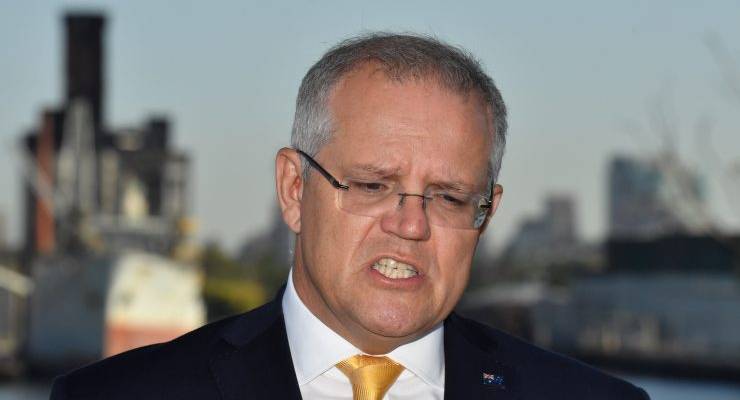
If chutzpah was combustible, Prime Minister Scott Morrison could single-handedly solve the global energy crisis.
After ostentatiously not attending the UN climate action summit, our “man of titanium” capped off his American tour by insisting that China, as a rising power, must do more to reduce emissions.
The effrontery was gobsmacking, not merely because the statement coincided with analysts and former diplomats accusing Scott Morrison of leading a “denialist government” — but also because, in 2018, Australia sold China about $15 billion worth of coal, a substance that, as you might have heard, bears some link to carbon pollution.
In 2016 when the Asian Infrastructure Investment Bank (AIIB) contemplated prioritising renewable energy projects throughout the region, then-treasurer Scott Morrison led the Australian lobbying effort to push funding back towards coal.
When, early the next year, the AIIB reversed its policy, Morrison could barely contain his delight.
“Australia’s national interest demands”, he said, “that coal continue to be part of our future energy equation, not just here in Australia, but around the world. That is why following our strong representations, I am pleased that the AIIB has now put fossil-fuel generation investments back into the mix for their energy sector strategy, which is now under discussion.”
Of course, the relationship between developed and developing nations poses genuine problems for environmentalists.
“The oft noted scandal of climate change,” explained Geoff Mann and Joel Wainwright in their book Climate Leviathan, “is that whose who caused it will not live to see its full consequences and those who are suffering or will suffer worst did not cause the problem.”
That’s usually presented as a generational issue: Greta Thunberg’s generation will confront the full horrors of a warming planet while Scott Morrison’s will not.
But it also relates to the history of industrialisation, and the particular methods rich countries generated their wealth. Nations which lack access to reliable infrastructure justly baulk at being told to eschew coal by countries that have burned industrial quantities of the stuff since the nineteenth century.
China might be the world’s biggest emitter of CO₂ but, on a per capita basis, it lags way behind the United States and Australia.
If we’re to avoid temperatures that render the planet increasingly uninhabitable, emissions in China — and, for that matter, India — must come down. But establishing a formula under which such reductions might accord with historical justice is no easy task.
And it’s not helped by the tension between the US and China, a rivalry under which climate negotiations, like so much else, increasingly gets subsumed. For that was surely the subtext of Morrison’s intervention: an assertion of allegiance to his new pal Donald Trump in the emerging cold war in the Pacific.
On the home front, the denunciation of China might also be understood as something of a troll, with the prime minister implying that Greta Thunberg embodies the “needless anxiety” children are being subjected to in a situation where the government has everything under control.
“It often comes as news to people when I share with them Australia has the highest per-capita investment in renewable energy of any country in the world,” Morrison explained. But, of course, there’s a reason for their surprise.
As the Australia Institute recently pointed out, Australia is also the world’s third-largest exporter of CO₂ in fossil fuels, ranked behind Russia and Saudi Arabia.
That’s the dirty secret of Australian climate politics, obscured by a bipartisan commitment to the export of coal.
Last month, for instance, Labor’s Pat Conroy insisted that Australians needn’t worry about what other nations do with locally produced coal since “the moral — and legal — responsibility for the emissions lies with the nation that burns the coal, not the nation that supplies the coal”.
It’s an extraordinary proposition, the kind of argument a drug peddler might use to assuage a guilty conscience: I might have sold you the heroin, but it’s on you that you used it!
But it’s a sentiment that Morrison shares. As a result, he sees no contradiction in lobbying China to buy more coal while simultaneously urging it to reduce emissions. The hypocrisy would be almost comic, were it not for that little matter of an ever-worsening planetary emergency.








Crikey is committed to hosting lively discussions. Help us keep the conversation useful, interesting and welcoming. We aim to publish comments quickly in the interest of promoting robust conversation, but we’re a small team and we deploy filters to protect against legal risk. Occasionally your comment may be held up while we review, but we’re working as fast as we can to keep the conversation rolling.
The Crikey comment section is members-only content. Please subscribe to leave a comment.
The Crikey comment section is members-only content. Please login to leave a comment.